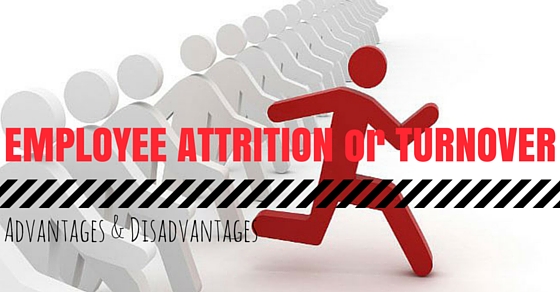What Do You Mean By Attrition?
Attrition and Turnover is used interchangeably nowadays by the organizations, the term has gone through a lot of change over the years.
Employee attrition means the process of gradual worn out– when the employees after years of work would want to move out and relax.
This process as coined should take around 40 years. This is what generally the working years of any professional was in the past, the term has changed and in this century the process takes just 3 – 4 years on an average.
It has become abrupt, sudden and sometimes highly drastic. The term thus, has become synonymous to employee turnover.

Kind of Turnovers and What They Mean in an Organization?
Employee turnovers takes place in various forms in an organization and each form has a different effect on the organization. Let see what these types are.
1. Internal Turnover:
There are times when employees leave one project or function in an organization and move to another one.
This is mostly a positive change and a skilled professional stays within an organization. This generally happens under organized HR process and under the company’s policies.
However, if there are many such changes even within the organization then it must be alarming. It is best that reasons for the same are looked for and remedial actions are taken as it creates a negative image of the current process that people leave.
2. External Turnover:
Employees leave their organization and join competitor’s organization because of better pay packages, working conditions, flexibility and mostly better superior.
These situations are a reason employers need to closely look for reason what employee provides when they leave the organization.
3. Ease of Employment Opportunity:
Unskilled labors are generally seen leaving organizations and moving out in no time. This is because of a lot of reasons, major being they feel exploited given there is no job security.
Skilled professional on the other hand are secured by policies, contracts and mostly their qualifications. They remain with the organization for long unless something major happens.
The organization generally does not realize the need to create a positive environment for unskilled labors. This should be changed as they are the major workforce especially for manufacturing units and similar undertakings.
Disadvantages of Employee Attrition:
When employees leave the organization it is a loss to the company, the team and the individuals.
Employees are the backbone of any organization and their departing may lead to lot of various losses to company on different aspects. The disadvantages can be
1. Decreased overall performance:
The whole business process is affected when an employee leave the organization. It is even more risky when this happen all of a sudden.
There is no time to train the new employee who is to take over the job and the whole team gets affected. It can directly be seen in an overall decrease of performance of the team.
Sometimes this may even lead to drastic change in customer relationship. Customers connect with employees in an organization and those leaving all of a sudden may lead to doubts in customer’s minds as well.
2. Daily task management:
Sudden attrition may lead to difficulty in managing daily tasks. Even large organization struggle to manage their task when employees leave jobs, getting small information and managing daily tasks become difficult as they cannot be managed by small current team which is left behind.
Organization generally have notice period to ensure there is a smooth transition but attrition states otherwise, employees who leave suddenly leads to unmanageable daily routines.
3. Increased cost:
This has to be the highest disadvantage to a company when employees leave their jobs. There is increased cost associated with every level of the process – losing and paying the previous employee, hiring a new one, training cost for the new employee.
Research shows that these costs are way more than the losses incurred in managing and missing out on work.
4. Lack of knowledgeable employees:
This goes without saying when employees leave an organization they take with them the experience they have gained overtime.
With organizations which has high attrition rate the average years of experience of employees is really low. This result in low performance, lack of loyalty and cluelessness on what company has been through.
Older employees with their years of experience can take over critical matters which can never be trusted with these new employees.
Even with employees who have experience are hired they may suffer at taking care of critical business matter as they are new to company’s policies, culture and current employees.
5. Create a Negative image:
It is not just that employees are looking for job, even organizations are on the outlook of qualified professionals. When any company has high attrition rate it negatively impact the brand of the organization.
Recruiters’ state that they find it difficult to map qualified candidates to the organization, as candidates opts out fearing the attrition rate. The reasons may vary but a negative image work against the organization.
6. Employee development:
Many organizations have various employee development plans and higher attrition rate means losing out on it.
Employee development plans takes time and huge investments. When there is disturbance within the organization due to employees leaving the organization it affects the development process for all.
The money invested on the employee who leave is wasted; also it affects others who have to jump in to fill in for the lost employee affecting their career plan and growth.
These plans are structured and require dedication and time to reach the goals. A change mid way mostly means loss of the past work done which benefits none.
Advantages of Employee Attrition:
Not all turnovers are negative, we generally feel that an employee leaving the organization is detrimental to the organization, but there is a flip side to it.
Employees leaving an organization may lead to benefits. This type of job attrition is called ‘healthy attrition’ and is needed for growth and development of an organization
1. Higher manpower costs:
There are times when employees stay with the organization for long, which might mean that they are getting top of their pay scale.
This means that these employees are being paid a lot more than others who are doing similar job but are comparatively new in the process.
This excessive manpower costs leads to financial burden which is generally not identified on a regular run of the companies.
2. Negative effect of people:
There are some employees in an organization who work against the culture of the organization and even affect the working environment.
Such employees even go to an extend to impact the loyalty of others and their outlook towards the organization.
This could mean they are working against the organization from inside. When such employees leave the organization they lead to more profit than loss.
3. New idea:
Many a time when some people leave an organization they open gates for new talent and new ideas.
Mostly employees who are in the organization get used to the working atmosphere and get complacent. This means lack of risk and definitely no new ideas.
When they leave there is space for people who have high risk taking caliber and stop the firm from becoming stagnant.
4. Higher performance:
There are employees who just have been working on a slow pace for years within an organization. They are reasons for poor performance and slow growth.
When they leave the organization the team becomes fast paced and the turnover time is decreased considerably. This means reduced cost and satisfied clients.
5. Setting the culture right:
There are times that employees do not care for a lot of organization’s policies which creates a brand for the organization.
When strong actions are taken against such employees like asking them to leave because they were affecting the brand name in a negative way would lead to a strong message and create a professional culture in an organization.
How to Retain Your Best and Brightest Employees?
The advantages in attrition is seen when only wrong people leave the organization. It is of utmost importance that employees who are productive should be retained in the organization to ensure that the company has the strongest workforce.
Research shows that many times reasons for high attrition, low performance, lack of motivation are not the fault of the employee but that of the superior they work for.
Mostly people who become supervisors lack people’s skills which lead to such negative impact on the work force. This should not become a reason for employees to leave the work place.
There are a few things organizations can do to ensure that the employees be with the organization for long.
1. Measure employee satisfaction:
Most reason of discomfort and dissatisfaction of the employee are known at the time of him/her leaving the organization.
A strong measure to know how satisfied the employees should be, build within the organization. A very powerful way used by organization is survey method- here the details of the employees are kept confidential and some organizations even hire other organizations to get this work done by them.
These surveys are built around parameters that shows how comfortable employees are working in the organization. These surveys also help to bring out the problem areas which should be strategically taken care of by the organization.
2. 360 feedback:
Mostly employees leave organization as they feel powerless in front of the authority. Managers/supervisors are responsible for their rating and feedback which makes employees insecure.
A very effective system is 360 degree feedback which involves subordinate providing feedback about supervisors to the organization.
This will create a balance and even resolve many issues that are between the team members.
3. Compensation:
If the reason for high attrition is higher compensation or benefit with the competitor it should be addressed immediately.
This can be done by having a compensation policy which is at par with other competitors. This will make you keep pace with the competitors and retain your current talent.
Mostly industry pay is a good scale to measure your compensation policies, benefits and perks, also play an important part here as they are hold as dearly by employees as the compensation is.
4. Setting the organization culture:
There are many components to set a culture within an organization; the most effect is the one which has clear communication.
When there is two way communication there is less grapevine channels and all information is reached across on the right manner.
Employees and employers will benefit when anything that has to be communicated is direct and reaches the right person in time.
5. Exit interviews:
There is nothing more important than giving employee time when they plan to leave the organization.
Exit interviews are the best way to find out what the employees need and what are the main reasons why they have decided to leave.
Employees are honest and fearless when they come for the exit interview and they state the real reasons for them leaving, these can be used to make changes in the policies or rectify what mistakes the organization is making in the process.
Sometimes at these interviews strong employees are retained within the organization by setting right things and by accepting their demands.
Companies work on a large scale and it is a common phenomenon of employees joining and leaving organizations.
Anything is excess is always detrimental and thus organizations should always keep in mind that they have a strong response to attrition. They should have a strong parameters to calculate their attrition rate.
It should always be compared to the industries attrition rate and no case it should be higher than that. If it is higher, it is always beneficial that rectification measures are taken.
Attrition even when disadvantageous can be managed when the companies have a plan for them. A strong strategy to deal with attrition rate is advised to all organizations.







































